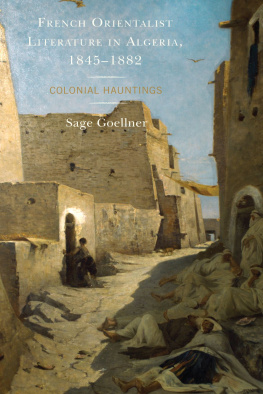This edition is published by PICKLE PARTNERS PUBLISHING www.picklepartnerspublishing.com
To join our mailing list for new titles or for issues with our books
Or on Facebook
Text originally published in 1917 under the same title.
Pickle Partners Publishing 2013, all rights reserved. No part of this publication may be reproduced, stored in a retrieval system or transmitted by any means, electrical, mechanical or otherwise without the written permission of the copyright holder.
Publishers Note
Although in most cases we have retained the Authors original spelling and grammar to authentically reproduce the work of the Author and the original intent of such material, some additional notes and clarifications have been added for the modern readers benefit.
We have also made every effort to include all maps and illustrations of the original edition the limitations of formatting do not allow of including larger maps, we will upload as many of these maps as possible.
Letters of a Chasseur Pied
Robert Pellissier
THE SPIRIT OF FRANCE AS PORTRAYED IN THE LIFE OF A FORMER WILLISTON TEACHER KILLED IN THE SOMME OFFENSIVE
By ADELINE PELLISSIER
PROFESSOR OF FRENCH IN SMITH COLLEGE
On September 18th news reached us that Robert Pellissier, of the French chasseurs pied, had been killed in battle. To his family his life has been and always will be the greatest inspiration. When I think of my brother's life, the picture which rises before me is that of a young horseman coming at full speed over hill and dale. He is neither dismayed nor halted by any obstacles; he clears them all lightly and with a joyous shout. At the end of his course, he meets death on a battlefield, bravely fighting for France.
One of Robert's chief characteristics was his profound attachment to his native land. He was born in 1882 at La Ferrire-sous-Jougne, Doubs, in the Jura Mountains, and the severe and almost tragic beauty of the fir tree forests, extending for miles over the mountainsides, was so strongly stamped on his memory that he always longed for fir clad mountains and loved those landscapes best which came nearest to this type of natural beauty.
Robert was the youngest of a family of seven children, and as his father died when he was but six years old, in the course of his life, when he came in closer contact now with one and now with another of his brothers and sisters, he eagerly asked them for his share of the moral guidance left them by their father as their most precious heritage.
Robert's father, after having lived the greater part of his life near Grenoble and in Lyons, had finally become superintendent of a large wire and nail factory at La Ferrire. The owners of the mill, the employees, the eight hundred workmen constituted the Whole settlement. As in this Roman Catholic community our family was the only one which was of Huguenot ancestry, and as the only Protestant church was several miles distant, our father, in his own way, gave us religious training. In summer, on Sunday, when the weather was fair, he often took us to a part of the forest where old fir trees, standing wide apart, left an open space as dark and mysterious as a cathedral, and there he would read to us either a psalm of David or a passage from the Gospels, and the reading over, he would tell us how, in olden times, our Huguenot ancestors had fought for their faith and how for centuries before the great French Revolution, they had prayed and worshipped in the wilderness, in some clearing or by the side of a stream.
Sometimes my father would tell us about the Huguenots of the Cevennes, and sometimes he would describe the wanderings of the Waldenses, following them from France into Italy and from Italy back into France. But the whole trend of this religious instruction was that external ceremonies are of but little importance and that the spiritual side of worship is the main thing.
An interesting story shows how this lesson was understood by my sister Marie at the early age of six. Having been invited with seven other little girls to hold the white ribbons of a pall at a child's funeral, in the Catholic church, Marie remained standing through the whole ceremony, although her little friends kept tugging at her dress, to make her kneel down. When they asked her the reason for such indecorous behavior, Marie answered: I worship in truth and in spirit. Five years older than Robert, she handed down this conception of moral courage to him. It must be added that our father felt that whatever form of religion a man accepted he must live up to it, and he always urged his men to keep in touch with their church and with their priest, so broad was his spirit of religious toleration.
My sister Marie, who is no longer living, was Robert's earliest instructress. Long before Marie could read, she knew some poetry by snatches. She had picked up this knowledge at the breakfast table, for my father, who went to the mill at six o'clock in the morning, returned home at eight, to have breakfast with his family. From his office to the house, he used to read and, after he had sat down at the table, he would repeat to us, with fiery enthusiasm, the passages he most admired. Sometimes it was a passage from the work of a philosopher or an historian, Pascal or Michelet, but still more frequently he would recite a few stanzas from our great poets: de Musset, de Vigny or Victor Hugo. Marie did not know the titles of the books, but she knew part of their contents. She had no difficulty in singling out, on the shelves, the book with the red binding which to her meant:
Pote, prends ton luth, et me donne un baiser;
La fleur de l'glantier sent ses bourgeons clore,
Le printemps nat ce soir; les vents vont s'embraser;
Et la bergeronnette en attendant l'aurore,
Aux premiers buissons verts commence se poser.
She could tell also that in another volume was to be found:
l'aime le son du cor, le soir, au fond des bois.
Soit qu'il chante les pleurs de la biche aux abois,
Ou l'adieu du chasseur que l'cho faible accueille,
Et que le vent du nord porte de feuille en feuille.
By Marie this poetical knowledge was imparted to Robert.
If I give these apparently insignificant details it is because, in my opinion, they account for an early sense of discrimination between good and bad literature, a certain natural sense of rhythm which in my brother seemed to be inborn. Every now and then there was a sad and gloomy day in our home; our father would come in and say with a look of profound despair on his face: Le ministre est tombthe ministry has fallenand, on such a day, even the younger children were made to understand that the French Republic was like a ship without a pilot; they firmly grasped the idea that beyond the family there was France, and that France was in danger.











